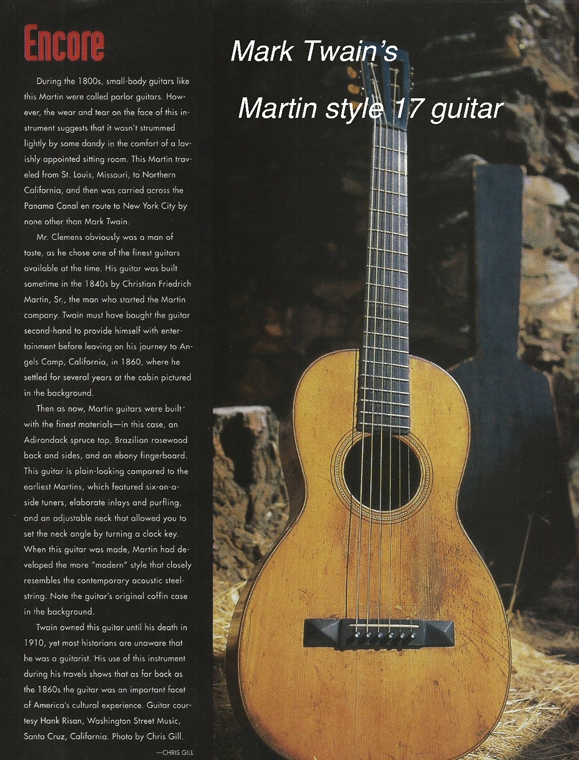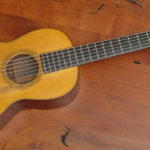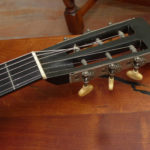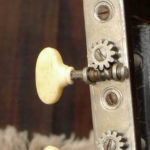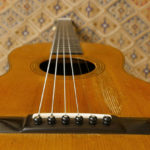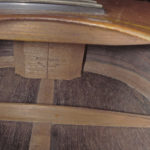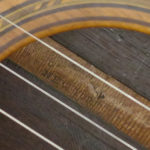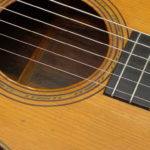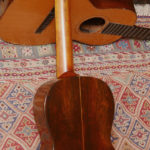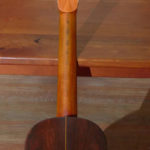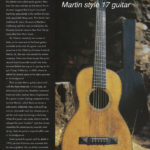Project Description
Considered by many to be most charming, intimate, 19th century Martin parlor guitar, the Martin 3-17 features Brazilian Rosewood back and sides, Adirondack spruce top, and Jerome tuners. This particular instrument, with an unbelievably beautiful, lyrical voice, was made in the early 1850’s, as we can tell by several clues. It’s a lot like Mark Twain’s famous Martin 2 ½-17 (see photo).
Of course, it has to have the “CF Martin New York” not “CF Martin & Co” stamps– as this one does, to make it a pre-1867 Martin. Also, according to Martin scholars, Jerome tuners seem to have faded out by the late 1850s, to be replaced with similar tuners with a shorter plate and no name stamp. It is unusual on this guitar that the Jerome tuners are German silver, as most of the style 17 guitars have brass tuners. With the “tulip-shaped” tuner buttons, experts date the guitar to the early 1850s.
The top is fan braced. Measurements are: body length 17.25″, lower bout width 11.125″, upper bout width 8.25″, overall length 35.75″, scale length just shy of 24 inches. 12 fret cedar neck with ice cream cone heel. Note that the black paint on the back of the neck and back of headstock was removed in some previous century– that does give a nice look at the cedar that would normally be obscured by the black “ebonized” paint.
The body of the guitar had some overspray, but it turned out go be one of those fortunate occasions where it was light and really just sitting on top of the original finish, so we are able to easily remove it and reveal the original finish.
A couple of small hairline cracks in back, repaired. Top and sides are crack-free. Reproduction ebony bridge. Original bar frets. Original Jerome Silver tuners, with original buttons. Original bracing and bridge plate. “C.F. MARTIN / NEW YORK” hot stamped on back, inside back brace and heel block (but the back stamp is faded).
A previous owner of this guitar had a custom hard shell case made– it’s a professional quality, premium case that protects the guitar quite well– it’s heavy and sturdier than most new expensive hard shell cases.
Historical interest aside (pre-civil war Martin guitars are rare), this guitar plays wonderfully. It projects the sweetest, but robust, glassy trebles, and clear mids and bass notes. It’s just a joy to play, and it just floats in your hands. (Note: 19th century Martins can be fitted with: gut strings, classical guitar strings, or extra light steel strings– depending on the guitar. It’s really a case-by-case basis, determining whether a particular 19th century Martin can “hold” or “withstand” very light gauge steel strings for example. One size does not fit all. And different 19th century Martins sound better with different strings. In this case, with this particular guitar, extra light steel strings are perfect. It can hold them fine– due to the structure of the top, the bridge plate, and bridge. And it plays and sounds perfect with those strings. This guitar is real find in that regard– not for the collector’s wall but for the player who wants to experience what the original CF Martin felt when he held this instrument in his hands in Nazareth, Pennsylvania, when Abraham Lincoln had not the slightest inkling he’d be in the White House and was just forging a reputation as an outstanding lawyer and earning the nickname of ‘Honest Abe’, and the New York Times was just commencing operations, and the first oil well had just been drilled in the United States by “Colonel” Edwin Drake in Titusville, Pennsylvania– that despite being in C.F. Martin’s state was darn near the old west at the time.
In a custom made, professional quality hard shell case.
